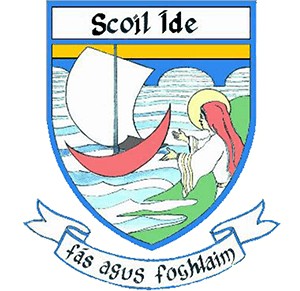Protected Disclosures Policy
What is a Protected Disclosure?
“A protected disclosure means disclosure of relevant information, which in the reasonable
belief of the worker, tends to show one or more relevant wrongdoings and which came to
the attention of the worker in connection with his/her employment”.
In making a disclosure, a worker must reasonably believe the information disclosed to be
substantially true. No worker will be penalised simply by getting it wrong so long as the
worker had a reasonable belief that the information disclosed shows, or tends to show,
wrongdoing.
The Protected Disclosures (Whistle-blowers) Act 2014:
The above Act came into effect on the 16th of July 2014. Schools are required to put a
Protected Disclosure policy in place which meets the requirements of the Act. The Board of
Management of Scoil Íde takes the issue of wrongdoing seriously and as a result has drafted
this policy.
What are “Relevant Wrongdoings”?
Relevant Wrongdoings include but are not limited to the following:
- The commission of a criminal offence.
- Non-compliance with a legal obligation.
- Danger to Health & Safety of an individual.
- Improper use of public funds.
The relevant wrongdoings may already have taken place, be happening or be likely to
happen.
Who is a Worker as far as a school is concerned?
- All current and former employees (including permanent, temporary, fixed-term, casual and
substitute); - Contractors and consultants engaged to carry out work or services for the school;
- Individuals on work experience pursuant to a training course and trainees of/with the
school.
To whom do you make the Disclosure?
The vast majority of disclosures should be made, orally or in writing, to the school Principal
or to the Chairperson of the Board of Management. Where this is inappropriate or impossible
there is provided a list of “Prescribed Persons”. In relation to schools the Prescribed Person is
the Secretary General of the Department of Education and Skills (DES).
What protections are available to whistle blowers (Disclosers)?
Among the protections are:
- Protection from dismissal.
- Up to 5 years’ remuneration for unfair dismissal.
- Protection of identity (subject to certain exceptions)
- Protection from penalisation by the school Board of Management.
What is best practice?
If you, as a member of staff, have a genuine or reasonable concern that there is wrongdoing
in the school you should report it to the Principal. If this is not appropriate or possible, you
should then report it to the Chairperson of the Board of Management. Workplace grievances
should be reported in the normal manner and are not covered by this policy. It should be
noted, that while internal reporting is encouraged, you have the option to raise concerns
outside of the school’s Board of Management and report to the Secretary General of the
Department of Education and Skills.
Confidentiality:
The Board of Management of Scoil Íde is committed to protecting the identity of any worker
making a protected disclosure and will ensure that protected disclosures are treated in
confidence. However, there are circumstances, as outlined in the 2014 Act, where
confidentiality cannot be maintained, for example, where the Discloser makes it clear that
he/ she has no objection to his or her identity being disclosed and/or the identity of the
Discloser is critical to an investigation of the matter raised. If it is decided that confidentiality
cannot be maintained in the context of an investigation, the school will inform the Discloser
in advance that his /her identity will be disclosed.
This policy was adopted by the Board of Management on 13/05/2019.
Signed: Patrick Meghen
Chairperson of Board of Management
Date: 13/05/19
Signed: Grace Burke
Principal/Secretary to the Board of Management
Date: 13/05/19
